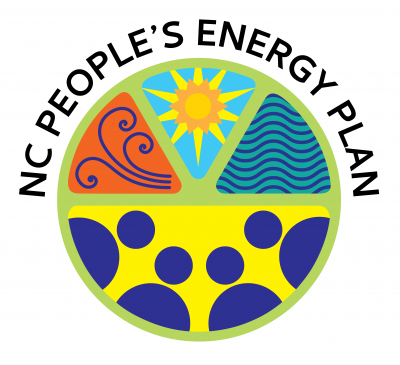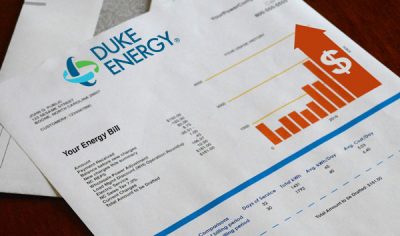Front Porch Blog

Hi, my name is Maddy. I’m a new Energy Democracy field coordinator for Appalachian Voices working in North Carolina. I’m writing to tell you about myself and the project I will be working on over the next year in collaboration with the Energy Justice North Carolina coalition.
As a newer professional in the energy policy space and as a young-ish person, I’ve spent a lot of time feeling confused, overwhelmed and powerless. Whether you feel concerned about reducing greenhouse gasses or paying your bills, utilities are not an easy thing to navigate. For me, the more complicated and inaccessible something is, the more I feel powerless to change it.
I want to help redirect this trajectory, and I think the best way to do that is to talk to people and build community.
Since starting this job, I’ve had so many friends and family members ask me about the work I will be doing and then say, “Oh great, can you tell me how much it costs to put solar on my house?” or “Why aren’t utility companies just switching to renewable sources?”
These questions should have straightforward answers, but they don’t. Furthermore, when we are talking about reducing energy pollution and being able to afford utility bills, it’s not always about solar panels. It’s also about making sure that people have access to efficient homes and have the support to make better choices.

Graphic created by Appalachian Voices staff
After two years of graduate school and living mostly on a single income, making even minor adjustments to improve the energy efficiency in our house wasn’t in our budget.
We decided not to have our propane tanks refilled, but kept a little gas to ensure that if we needed it, we would have backup heat. Since deciding not to use any gas, we have had to pay the propane company almost $300 for a service we don’t use and, while we still save a little money because we collect and chop our own wood, it feels a lot more like being punished for trying to make a better choice.
I know there is nuance to this situation. We are able-bodied people who have the privilege of owning a home. The propane company has to make money and is not necessarily at fault for trying to maintain a profit or to pay the salaries of the nice people who are sent to our house to collect money for a service we don’t use.
I’m not telling this story to invoke sympathy. I’m sharing this because energy policy is not just about the complicated large-scale problems, and therefore we should have more policy plans that reflect decisions that individuals make every day.
These are the kinds of conversations I hope to have with folks throughout the process of developing the People’s Energy Plan, while also making sure this plan is not only about the struggles that individuals face when it comes to utilities, but highlights ideas and goals for the future.
At the beginning of this blog, I mentioned feeling powerless. What makes me feel powerful and hopeful is when people come together to address something complex. The first step to gaining control of our energy system is imagining how it can change.
I believe that our energy system needs to be cleaner and more affordable. It needs not to saturate some communities in pollution while leaving others untouched. But I’m just one person, and I need help making sure the People’s Energy Plan reflects all of North Carolina.
Over the next year, I, along with others from Energy Justice North Carolina, plan to conduct listening tours, surveys and interviews across the state. We wish to collaborate with both individuals and organizations to reach as many communities as possible throughout 2022 and early 2023. We plan to use these tours, surveys and interviews to create policy platforms that can be utilized at both the state and local levels.
Please join this process!!!
We are holding two virtual information sessions on Tuesday, June 14, at 7 p.m. and Thursday, June 16, at 2 p.m. Please register in advance.
I hope to see you there! Tell your friends, tell members of organizations and tell your family. And if you can’t commit to those dates at this time, please sign up for updates at Energy Democracy Y’all.
PREVIOUS
NEXT

Leave a comment
Your email address will not be published. Required fields are marked *
3 responses to “The North Carolina People’s Energy Plan”
-
Sorry about the typos. I didn’t proof read and make the corrections.
-
I would like to know what solar panels are made of along with wind turbines. I would also like to know what kind of particles are released when damaged through storms and how they are desposed of. I would like a truthful answer on the impact both have on our birds and bees. I’ve done research on both since 1998 and have not found where either are healthy for our planet but more harmful. Along with the batteries of EV cars. Why aren’t we using all of the trash to turn into energy instead?
I’ve posed these questions since 1998 and have yet get a direct answer. Only what certain officials direct to say. Mainly what I’ve witnessed are certain words of marketing that lie to people that make matters worse instead of actual real results that are beneficial because government officials know most won’t research what they’re being told. The carbon foot print of solar alone is atronoimical. Our continents are still moving and the planet has cycles. Is any of the this factored in? Also, is it factored in how data has been manipulated?
I am a nature lover and have witnessed the lies.
Please don’t take me as attacking. I’m not. I’m just tired of being lied to and watching good hearted people being manipuated out of power and greed. -
Thank you for your dedication and knowledge about the efficient use of energy resources. This is for our present life and those that will inherit the future of our planet. I know you can make it better.

Leave a Comment